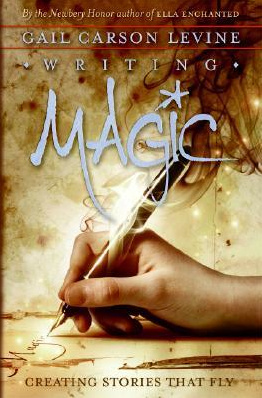

Gail Carson Levine · 168 pages
Rating: (2.3K votes)
“There's nothing wrong with reading a book you love over and over. When you do, the words get inside you, become a part of you, in a way that words in a book you've read only once can't.”
― Gail Carson Levine, quote from Writing Magic: Creating Stories that Fly
“When you become a teenager, you step onto a bridge. You may already be on it. The opposite shore is adulthood. Childhood lies behind. The bridge is made of wood. As you cross, it burns behind you”
― Gail Carson Levine, quote from Writing Magic: Creating Stories that Fly
“When I write, I make discoveries about my feelings.”
― Gail Carson Levine, quote from Writing Magic: Creating Stories that Fly
“The Writer's Oath
I promise solemnly:
1. to write as often and as much as I can,
2. to respect my writing self, and
3. to nurture the writing of others.
I accept these responsibilities and shall honor them always.”
― Gail Carson Levine, quote from Writing Magic: Creating Stories that Fly
“I write fiction for lots of reasons. One is power. I'm in charge when I write. So are you. You create the world of the story. You make the rules.”
― Gail Carson Levine, quote from Writing Magic: Creating Stories that Fly

“Nobody takes that boat out forrr months, and now all of a sudden everrrybody needs it.” Alex”
― Lisa McMann, quote from Island of Silence
“Dictatorships may seem strong and unified, but they are always weaker than they appear.”
― Hyeonseo Lee, quote from The Girl with Seven Names: A North Korean Defector’s Story
“Intentions are the only thing they care about. They try to make you think they care about what you do, but they don't. They don't want you to act a certain way, they want you to think a certain way. So you're easy to understand. So you wont pose a threat to them.”
― Veronica Roth, quote from Four: A Divergent Collection
“Maybe you could casually mention to Zoe that I'm not now, nor have I
ever been, an axe murderer."
"I'll see if I can work it into our next conversation," Flynn promised.”
― Nora Roberts, quote from Key of Knowledge
“Willing as both men were to suggest what and whom Roosevelt might attack—for he was clearly in a fighting mood—they cautioned him to “go a bit slow” at first, and to discuss a program of reform with his colleagues.26 But Roosevelt knew he could achieve little in this job by proceeding deliberately; it was about as powerful, in constitutional terms, as his last. Once again he must exercise his genius for press relations. Instinct told him that these scribes would be of more use to him than the three Commissioners now waiting in the hallway.27”
― Edmund Morris, quote from The Rise of Theodore Roosevelt
BookQuoters is a community of passionate readers who enjoy sharing the most meaningful, memorable and interesting quotes from great books. As the world communicates more and more via texts, memes and sound bytes, short but profound quotes from books have become more relevant and important. For some of us a quote becomes a mantra, a goal or a philosophy by which we live. For all of us, quotes are a great way to remember a book and to carry with us the author’s best ideas.
We thoughtfully gather quotes from our favorite books, both classic and current, and choose the ones that are most thought-provoking. Each quote represents a book that is interesting, well written and has potential to enhance the reader’s life. We also accept submissions from our visitors and will select the quotes we feel are most appealing to the BookQuoters community.
Founded in 2023, BookQuoters has quickly become a large and vibrant community of people who share an affinity for books. Books are seen by some as a throwback to a previous world; conversely, gleaning the main ideas of a book via a quote or a quick summary is typical of the Information Age but is a habit disdained by some diehard readers. We feel that we have the best of both worlds at BookQuoters; we read books cover-to-cover but offer you some of the highlights. We hope you’ll join us.